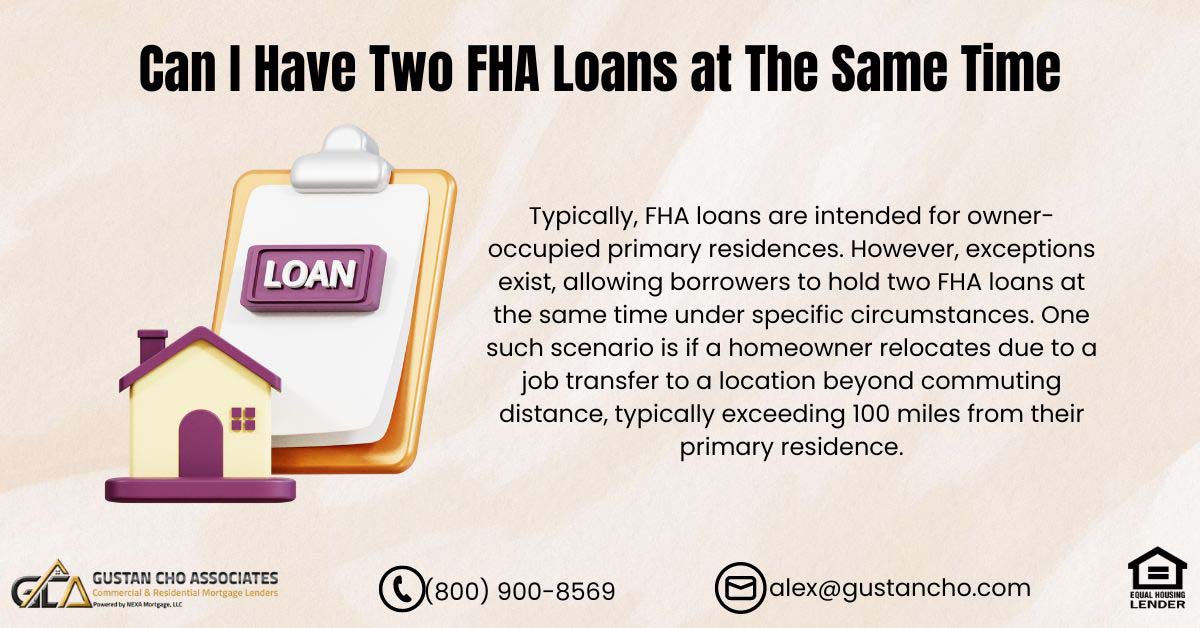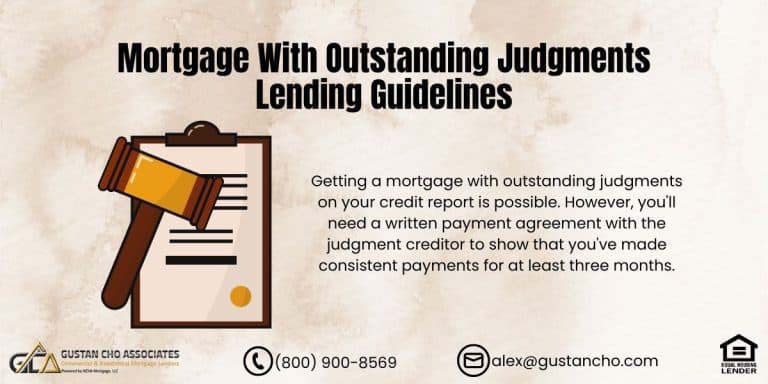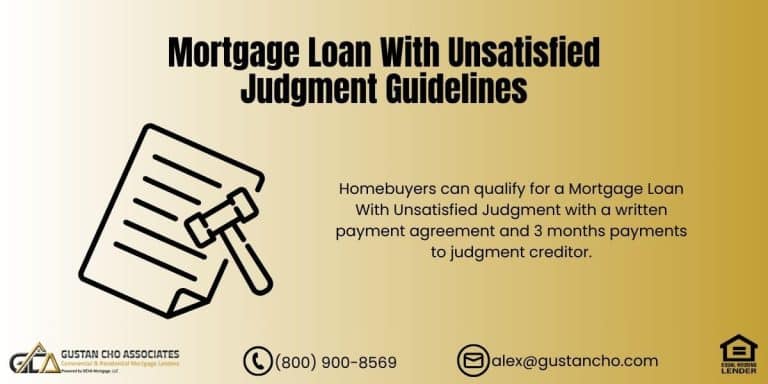This guide explains the requirements for obtaining two FHA loans at the same time. This is important information for those who want to finance two primary residences. Joey Virga, the President and CEO of Virga Realty, a distinguished real estate company headquartered in Panama City, Florida, shares insights into his clients’ journey to obtain approval and finalize transactions involving two FHA loans simultaneously.
There are instances where homeowners can get a sudden job relocation to a location beyond commuting distance, where a homeowner currently has an FHA loan, and a job transfer at least 100 or more miles from their current residence. If the above holds true, they can qualify for two FHA loans at the same time.
FHA mortgages are primarily intended for owner-occupied primary residences, excluding second homes or investment properties. HUD, the governing body of FHA, typically allows borrowers to have only one FHA loan, considering their primary residence status.
However, exceptions exist, permitting homeowners to possess two FHA loans at the same time. In the following paragraphs, we’ll explore the intricacies of having two FHA loans at the same time.
Speak With Our Loan Officer for Mortgage Loan
Purpose For FHA Loans
The Federal Housing Administration created the FHA Loans to help hardworking Americans achieve their dream of owning a home. These loans have minimal upfront costs and lenient lending requirements, making it easier for people to qualify. FHA loans stand as the most favored loan option across the United States.
If you plan to buy a house, you can qualify for eligibility by making a down payment of 3.5% and having a credit score of 580 or higher. Additionally, individuals with imperfect credit histories can still qualify for FHA Home Loans, even with outstanding collections or charge-offs, without necessitating the settlement of the overdue balances.
FHA loans primarily encourage primary residence homeownership rather than investment properties or secondary residences. However, exceptions to this rule exist, notably the ability to hold two FHA loans at the same time.
How To Qualify For Multiple FHA Loans
Exceptions exist for obtaining more than two FHA loans at the same time. While typically not permitted, homeowners with an existing FHA loan seeking to upgrade to a larger property may qualify for an additional loan. However, simultaneous FHA loans are not allowed. The new property must serve as the primary residence, and the arrangement should be financially sensible.
Ronda Butts, a realtor and loan officer holding dual licenses, elaborates on the regulations regarding simultaneous FHA loans:
Suppose the exiting property is an FHA loan. The new owner-occupant home purchase needs to be conventional. The homeowner can also keep the first property with the FHA mortgage loan as an investment property. If they have at least a 75% Loan to Value (LTV) on the exiting property, they can use 75% of the potential rental income on the departing residence.
Consider this scenario: Suppose a homeowner is transitioning from a one-bedroom condominium to a single-family home due to their expanding family, making it logical for them to qualify as an owner-occupant for the new property. However, the situation changes if the homeowner upgrades from a 3-bedroom to a 4-bedroom home.
In such cases, the mortgage lender will likely closely examine the deal. They may insist that the homebuyer has a real estate listing contract to sell their current property, and the borrower must qualify for both mortgages. It’s important to note that while borrowers qualify for multiple mortgages, they cannot have two FHA loans at the same time.
Borrower Relocates To a Different Area
Borrowers are eligible for a second FHA loan if they relocate due to a job transfer to a location more than 100 miles away from their primary residence. This move must exceed commuting distance. In scenarios where an FHA loan holder undergoes a job transfer, they can have two FHA loans at the same time.
The distance requirement typically stands at 100 miles or more. Job relocation serves as a valid reason for such a move. In this situation, the borrower can retain their original home with the existing FHA mortgage as a rental property. Alternatively, they can sell the home once they move into their new residence.
Regardless of the chosen path, the borrower must qualify for both mortgages to qualify for the new FHA loan. This remains true unless they possess at least 25% equity in their first home and a lease agreement. You must lease your property if you rely on 75% of your rental income to qualify for a new FHA mortgage.
You Can Have a Second FHA Loan If You Are a Co-Borrower on an FHA Loan
If you’re presently a co-borrower on an FHA loan, you can still qualify for a second FHA loan, even if you’re facing a divorce and leaving the shared household. This scenario is common, and the FHA allows individuals in such situations to pursue another loan. Despite your existing co-borrower status on the initial FHA loan, you’re still eligible to apply for a second FHA loan to facilitate your new housing needs or financial circumstances.
This flexibility provided by the FHA recognizes the changing dynamics of households and the need for individuals to secure suitable housing options, even after being co-borrowers on a previous FHA loan. It ensures that individuals facing life changes like divorce can still access the benefits of FHA loans for their housing requirements, providing a pathway to homeownership or refinancing opportunities when needed.
Non-occupant co-borrowers can qualify for a second FHA loan if they intend to occupy the property. Non-occupant co-borrowers can qualify for an FHA loan for their home purchase.
In the scenario of having two FHA loans at the same time, the debt-to-income ratio concerning the co-signed loan needs to be considered, provided the principal borrower can evidence 12 months of consistent payments without including payments made by the co-borrower. This provision allows the primary borrower to establish financial responsibility independent of the co-signer’s contributions.
In this context, non-occupant co-borrowers have co-signed FHA loans to assist family members in qualifying for a mortgage despite not residing in the property themselves. This distinction ensures that the financial obligations and qualifications of the primary borrower are the primary considerations in evaluating their eligibility for an FHA loan.
Borrowers and lenders must understand the FHA loan regulations related to co-signers and non-occupant co-borrowers. This can help them navigate the complexities of securing multiple FHA loans. By clarifying the treatment of debt-to-income ratios and the role of non-occupant co-borrowers, borrowers can make informed decisions about their mortgage options.
At the same time, lenders can accurately assess risk and compliance. Ultimately, this clarity fosters responsible lending practices and helps borrowers achieve their homeownership goals within the framework of FHA loan guidelines.
Click Here To Pre-Qualify For An FHA Loan
HUD Guidelines FOR Two FHA Loans at The Same Time
The Federal Housing Administration has set tough, strict FHA lending guidelines for those seeking a second FHA loan. For those homebuyers who need 75% of potential rental income from exiting their home to qualify for a new mortgage, FHA requires that the first home have a 75% Loan to Value or lower.
The potential rental income is derived from a home appraisal. The appraisal will determine the LTV. If the loan to value is higher than 75% LTV, the homeowner can pay down the balance so it is at a 75% Loan to Value or lesser.
For those who need to use the rental income of the first home with the FHA loan, a rental lease agreement must be provided to the FHA mortgage underwriter, and 75% of the monthly rental income can be used.
FAQs: Can I Have Two FHA Loans at The Same Time?
- 1. Can I qualify for two FHA loans at the same time? Typically, FHA loans are intended for owner-occupied primary residences. However, exceptions exist, allowing borrowers to hold two FHA loans at the same time under specific circumstances. One such scenario is if a homeowner relocates due to a job transfer to a location beyond commuting distance, typically exceeding 100 miles from their primary residence.
- 2. What are the requirements for obtaining multiple FHA loans? To qualify for two FHA loans at the same time, borrowers must meet certain criteria. Firstly, the new property being financed with the second FHA loan must serve as the primary residence. Secondly, borrowers must demonstrate financial prudence and feasibility in managing dual mortgages.
- 3. Can a homeowner upgrade to a larger property with an additional FHA loan? Yes, under certain conditions, homeowners with an existing FHA loan can upgrade to a larger property using another FHA loan. However, simultaneous FHA loans for multiple properties are generally not permitted. The new property must meet FHA’s primary residence requirements, and borrowers must undergo financial scrutiny to ensure their ability to manage multiple mortgages.
- 4. What if I am a co-borrower on an existing FHA loan? Co-borrowers on an existing FHA loan can still qualify for a second FHA loan, even if they are leaving the shared household due to reasons like divorce. The FHA allows individuals in such situations to pursue another loan to accommodate their housing needs or financial circumstances.
- 5. How does the debt-to-income ratio affect obtaining two FHA loans? In the scenario of having two FHA loans simultaneously, the debt-to-income ratio concerning the co-signed loan is a crucial factor. The primary borrower must demonstrate 12 months of consistent payments, excluding those made by the co-borrower, to establish financial responsibility.
- 6. What are the HUD guidelines for holding two FHA loans concurrently? HUD has established stringent guidelines for obtaining a second FHA loan. Borrowers needing to rely on rental income from their existing property to qualify for the new mortgage must meet specific criteria. This includes maintaining a Loan to Value (LTV) ratio of 75% or lower on the existing property and providing a rental lease agreement to use 75% of the monthly rental income.
Home Buyers needing to qualify with Two FHA Loans At The Same Time or borrowers who need to qualify for loans with lenders with no overlays on government and conventional loans, please get in touch with us at Gustan Cho Associates at 800-900-8569 or text us for faster response. Or email us at gcho@gustancho.com. We are available evenings, weekends, and holidays seven days a week.
Home Buyers Needing Two FHA Loans, Click Here.
This blog about Can I Have Two FHA Loans at The Same Time was updated on February 28, 2024.










